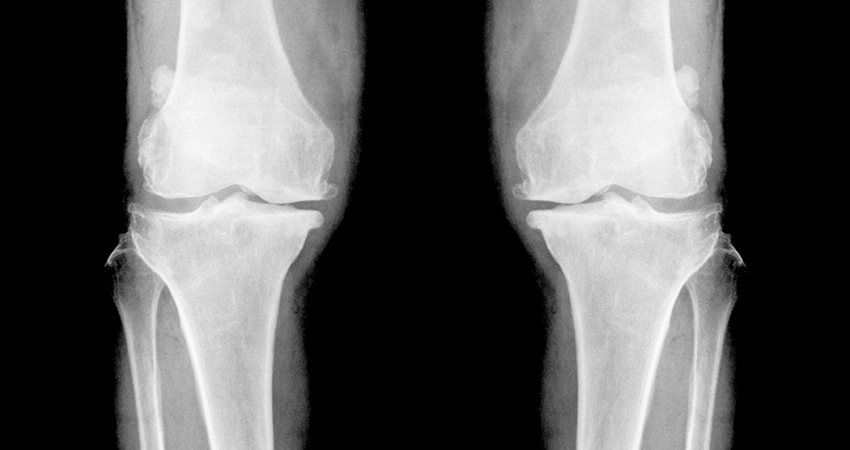New Scripps Research drug progressing through clinical trial, seeking to reverse underlying causes of osteoarthritis
As we get older, the aging of our bodies may often seem like a one-way street, what with the steady arrival of blurry vision, gray hair, wrinkled skin and other signs of time. But there is reason to take heart—at least for people suffering from one of the most common scourges of aging, osteoarthritis.
Osteoarthritis is the prevalent form of arthritis, affecting tens of millions of people worldwide. The disease stems from the wearing down of the cartilage that protects the ends of bones. Currently, the only non-surgical therapies for the disease are drugs that treat the pain and inflammation—the symptoms—while having no impact on the loss of cartilage, the underlying cause of the disease.

A new drug, developed by scientists at Scripps Research and being tested in an early-stage clinical trial, could change that. The idea for the compound, called KA34, emerged from the laboratory of Peter Schultz, PhD, a chemistry professor and the president of Scripps Research. Schultz and his team discovered a compound, called kartogenin, that generates chondrocytes from stem cells, the early-stage, highly flexible cells from which all specialized cell types develop.
When given to animals, the compound was effective at regenerating cartilage. The researchers reported their findings in a groundbreaking paper in the journal Science.
The promise of regenerating cartilage spurred Schultz and his team to pursue a version of the compound that could reverse osteoarthritis in humans. To do this, they turned to the drug discovery capabilities of Calibr, a separate nonprofit founded by Schultz that recently merged with Scripps Research as its drug discovery division.
KA34
Osteoarthritis afflicts about 40 million people in the United States and Europe.
“The story of KA34 is proof positive that integrating academic science and drug discovery capabilities offers incredible potential for speeding translation of foundational discoveries into real-world medicines,” says Schultz. “From the time we had a preclinical candidate identified to giving the drug to patients was roughly two years.”
In May 2018, Calibr scientists launched a Phase 1 clinical trial to test KA34 in 60 patients between the ages of 40 and 75 with osteoarthritis. The California Institute for Regenerative Medicine (CIRM), which financially supported the KA34 preclinical research effort from inception, awarded Calibr an additional $8.4 million for the clinical trial.
The trial is focused on assessing the safety of the drug, as well as its initial effectiveness in combating osteoarthritis. Together with Calibr, the clinical head of the KA34 program, Martin Lotz, MD, a professor at Scripps Research, has tested the drug on 16 osteoarthritis patients. Enrollment is accelerating as no drug-related adverse effects have been seen.
The Phase 1 trial is slated to wrap up by September 2019, after the drug is tested in all 60 participants. Assuming KA34 proves safe and shows initial signs of effectiveness, the next step would be a Phase 2 clinical trial to robustly test its ability to stop or even reverse the progression of osteoarthritis. In anticipation of the next trial, Calibr scientists are developing an extended release version of KA34.
“This is the first program of our new bench-to-bedside initiative to enter the clinic,” Schultz says. “Over the next two years we expect to move additional programs into development including therapies for cancer, malaria, and lung and neurodegenerative diseases.”